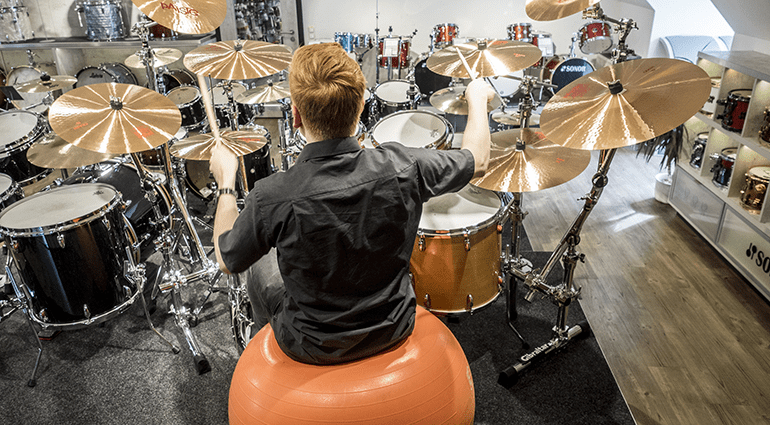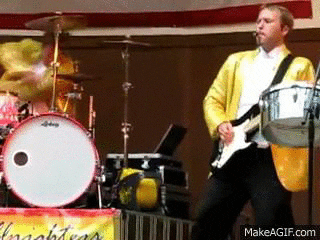
Guitar against the leg or chest, violin under the chin, drums under the foot – each instrument has its own individual ergonomics. Many of us have already painfully experienced that playing positions don’t always necessarily correspond to optimal posture. If there’s one area on the body that is extremely sensitive to incorrect postures and uneven stress loads, then it’s the back. Spinal problems are of course, not only reserved for musicians, but the probability of protruded intervertebral discs, and other back pain, is relatively high during long periods of playing in bad positions.
For several years, physicians have intensively devoted their research to the health of musicians. Especially in musician dense cities, where music colleges and orchestras are found, it is usually possible to find a physician to help identify the issue relatively quickly.
 But it doesn’t have to get to that. If you notice any pain or any musculature tension during or after playing , try to first figure out the cause. Anyone who knows their body, will quickly be aware of any critical postures, movements, or pressure that can be the cause of their inconvenience. The starting point of every self-examination is in a relaxed, standing position, starting from the head to the neck, shoulders, pelvis, knees and ankles. Every movement from this position requires muscle work and changes the statics. The intervertebral discs help support a heavy, distributed load. Once the spine bends, the load becomes uneven, causing pressure and stretches. This can lead to long-term wear and tear which can be detrimental.
But it doesn’t have to get to that. If you notice any pain or any musculature tension during or after playing , try to first figure out the cause. Anyone who knows their body, will quickly be aware of any critical postures, movements, or pressure that can be the cause of their inconvenience. The starting point of every self-examination is in a relaxed, standing position, starting from the head to the neck, shoulders, pelvis, knees and ankles. Every movement from this position requires muscle work and changes the statics. The intervertebral discs help support a heavy, distributed load. Once the spine bends, the load becomes uneven, causing pressure and stretches. This can lead to long-term wear and tear which can be detrimental.
Posture
 Start by analyzing your posture, and pay attention to details, because they may play bigger roles than you think. Imagine being a neutral observer, watching your ordinary movements such as sitting, standing up or walking. Or how you lift your instrument from its case and handle it. If certain movements are painful or uncomfortable, repeat them very slow and deliberately to make yourself aware of the muscles and tendons involved as well as any problematic areas. This works best in front of a large mirror. The surrounding area also plays a role: is your desk or music stand at the correct height or do you constantly need to tilt your head? Is your seat too low or is it too high that your feet can’t relax on the floor? Is your whole body out of balance? Is your instrument positioned comfortably, whether in your hands or on your body, or is it constantly forcing you into an unpleasant and strenuous position altogether?
Start by analyzing your posture, and pay attention to details, because they may play bigger roles than you think. Imagine being a neutral observer, watching your ordinary movements such as sitting, standing up or walking. Or how you lift your instrument from its case and handle it. If certain movements are painful or uncomfortable, repeat them very slow and deliberately to make yourself aware of the muscles and tendons involved as well as any problematic areas. This works best in front of a large mirror. The surrounding area also plays a role: is your desk or music stand at the correct height or do you constantly need to tilt your head? Is your seat too low or is it too high that your feet can’t relax on the floor? Is your whole body out of balance? Is your instrument positioned comfortably, whether in your hands or on your body, or is it constantly forcing you into an unpleasant and strenuous position altogether?
Practice
If you pay attention, you may notice small things that ultimately have a great impact on your well-being. A guitarist, for example, who believes they must hold their plectrum between the thumb and the forefinger more firmly than is actually necessary, will not be able to play relaxed. The pressure exerted on the thumb and fore-finger affects the hand, arm, shoulder, all the way down to the back. This applies to all instruments and is not just limited to fingers, and applies to all body parts involved in practice to the same extent.
Psychology
It is now clear that mental and emotional stress can also lead to physical problems often expressed in back pain. Those who are under pressure, either professionally or privately, who suffer from stage fright, and or perfectionism, are not only cramping up psychologically. In these cases relaxation exercises can work miracles, but here again it’s advisable to consult a physician at an early stage, before tackling psychological problems on top of a painful back.
Solution
It may seem self-evident, but in most cases, the combination of proper posture, exercise, and relaxation will provide pain relief and well-being. A proper warm-up and stretch before practicing or performing is a good way to begin. But, “I’m not a professional athlete!” some may say, which is partly true as we are much more than that. While some football players or athletes are already thinking about retiring in their 30’s, our instruments will (hopefully) accompany us for the rest of our lives.
Anyone aware of their back problems can, through targeted training, counteract further deterioration and even overcome the issue. However, inner demons play a major role, as tackling year old behavioral habits can be exhausting and tedious. Those who lack self-motivation, can find help in fitness studios as well as several institutions that specialize in back fitness. General back-fitness will strengthen muscles, and combat most of the issues by improving posture through functional movements. For self-treatment there are countless guides, training manuals, exercise tutorials in bookstores and certainly online.
2 comments
Leave a Reply
You are currently viewing a placeholder content from Facebook. To access the actual content, click the button below. Please note that doing so will share data with third-party providers.
More InformationYou are currently viewing a placeholder content from Instagram. To access the actual content, click the button below. Please note that doing so will share data with third-party providers.
More InformationYou are currently viewing a placeholder content from X. To access the actual content, click the button below. Please note that doing so will share data with third-party providers.
More Information




Toni Honkala says:
This is a really important topic. Besides starting to pay attention to one’s body, balance, and posture one could try to find a professional, educated teacher. A teacher could teach you to find proper playing position, and help you to learn to master your instrument.
marie julie says:
With spinal stenosis, It’s getting harder to play the cello. Can you help?